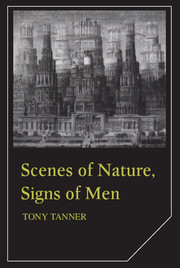Book contents
- Frontmatter
- Contents
- Preface
- 1 Scenes of nature, signs of men
- 2 Notes for a comparison between American and European Romanticism
- 3 Problems and roles of the American artist as portrayed by the American novelist
- 4 James on Hawthorne
- 5 The lost America – the despair of Henry Adams and Mark Twain
- 6 Henry James and Henry Adams
- 7 William Dean Howells and A Hazard of New Fortunes
- 8 Stephen Crane
- 9 The Bostonians and the human voice
- 10 Games American writers play: ceremony, complicity, contestation, and carnival
- 11 Toward an ultimate topography: the work of Joseph McElroy
- 12 Frames and sentences
- 13 William Gass's barns and bees
- Index
- Frontmatter
- Contents
- Preface
- 1 Scenes of nature, signs of men
- 2 Notes for a comparison between American and European Romanticism
- 3 Problems and roles of the American artist as portrayed by the American novelist
- 4 James on Hawthorne
- 5 The lost America – the despair of Henry Adams and Mark Twain
- 6 Henry James and Henry Adams
- 7 William Dean Howells and A Hazard of New Fortunes
- 8 Stephen Crane
- 9 The Bostonians and the human voice
- 10 Games American writers play: ceremony, complicity, contestation, and carnival
- 11 Toward an ultimate topography: the work of Joseph McElroy
- 12 Frames and sentences
- 13 William Gass's barns and bees
- Index
Summary
‘Exposed late in life to European influences, Mr. Hawthorne was but superficially affected by them – far less so than would be the case with a mind of the same temper growing up among us today. We seem to see him strolling through churches and galleries as the last pure American – attesting by his shy responses to dark canvas and cold marble his loyalty to a simpler and less encumbered civilization.’ That was how James concluded his first piece of writing on Hawthorne – a review of his French and Italian Note-Books which appeared in 1872. James was twenty-eight at the time and was very eager to return to Europe and pursue the vocation of novelist which he had already decided on. A month before writing this review he had written a letter to Charles Eliot Norton stressing his desire to get back to Europe, at the same time admitting that he might well be exaggerating ‘the merits of Europe’. To quote some now famous lines: ‘It's the same world there after all and Italy isn't the absolute any more than Massachusetts. It's a complex fate, being an American, and one of the responsibilities it entails is fighting against a superstitious valuation of Europe.’
- Type
- Chapter
- Information
- Scenes of Nature, Signs of MenEssays on 19th and 20th Century American Literature, pp. 64 - 78Publisher: Cambridge University PressPrint publication year: 1987

